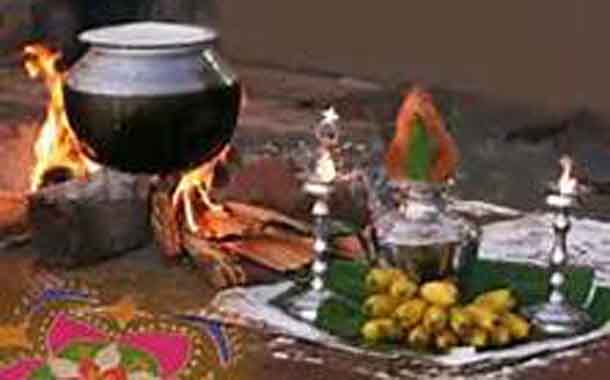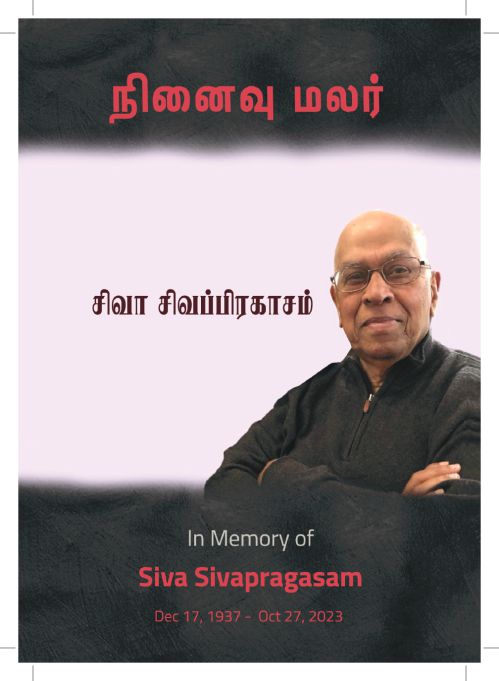Thai Pongal ??? The Thanksgiving ???Thamilar Thirunaal???
(In Gratitude for the bountiful Harvest)
By: C. Kamalaharan

Monsoon Journal Wishes Readers, Advertisers, Well-Wishers & Friends a Happy Thai Pongal January 14, 2018.
(This Pongal article by Mr. Kamalaharan is from Jan 2018 print issue of Monsoon Journal)
Thai Pongal is a harvest festival celebrated on the first day of the month ???Thai??? according to the Tamil almanac. It usually falls on the 14th or 15th of January each year. Being an important festival of the Tamils it is referred to as ???Thamilar Thirunaal.??? It is also a Thanksgiving festival thanking the Sun God and the farm animals for providing bountiful harvest for the year.
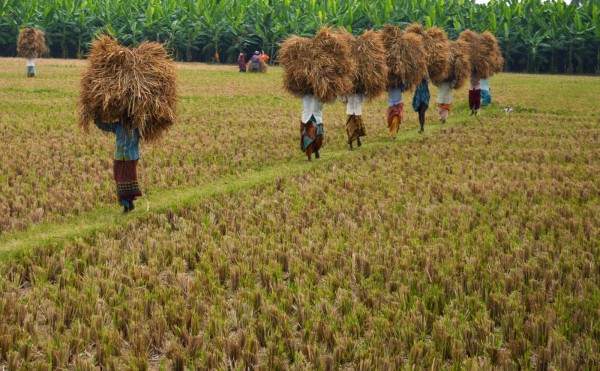
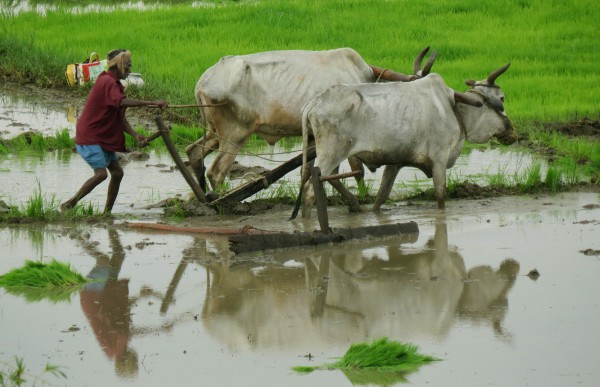
Thai Pongal is of astronomical significance. The day coincides with the Sun???s six month???s journey northwards referred to as ???Uttaraayanam??? which is considered auspicious. It also corresponds to the Sun entering the 10th house Makaram (Capricorn) from the 9th house of Dhanu (Sagittarius).
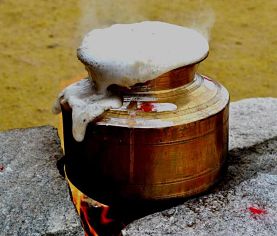
Pongal means ???spill over??? of the milk mixed in water while boiling. People wait anxiously for this joyous moment and lit crackers in jubilation. In Tamil Nadu particularly in rural areas farmers shout in ecstasy ???Pongalo Pongal???. When this occurs the head of the family takes a handful of newly harvested rice and drops it into the clay pot. Following this the remaining rice is allowed to slide into the clay pot. Later the ingredients jaggery, cashew nuts, raisins, cardamom and split green grams are added to make the Pongal palatable. Milk rice is also prepared without the addition of ingredients. This milk Pongal is served with ???sambal??? and a cooked mixture of vegetables known as ???sambar???.
Cooking is done in the direct view of the sun outside the house. In rural areas the square plot where cooking is done is disinfected by sprinkling a mixture of cow dung in water. Later the area is enclosed and sanctified by designing ???kolams??? with rice flour around the four sides. The clay pot is gently placed on a firewood hearth set up using a tripod of three stones, bricks or concrete slabs. After the spill over and the addition of rice into the pot the rest of the cooking is done by the women folks.

A portion of the cooked rice is served (padayal) on banana leaves with short eats; ???vadai???, ???murukku??? ???paayasam??? etc as offering to Sun God. All the members in the family take turn and circumambulate the area in piety carrying flowers. After circumambulating the area thrice they pray to the Sun God and drop the flowers on the banana leaves by the side of the hand made Ganesh statue. On request a member of the family sings ???Thevaram??? and ???Puranam??? (hymns in praise of the Lord). Following this ???Viputhi Prasadam??? is served culminating in the ceremony. All the members in the family jointly partake the Pongal and short eats.
But nowadays due to socio-economic changes and rapid advancement in technology rural areas have been urbanized and the people are always busy with heavy work schedules. So to ease tension Pongal is done in the kitchen using ever silver utensils replacing the earthenware. But all pray in piety in the shrine room by offering Pongal to the Lord.
In Tamil Nadu Pongal is celebrated on a grand scale. The entire Tamil Nadu becomes lively very early in the mornings during the whole Tamil month of Margazhy. The women after bathing design ???kolams??? in front of their houses while the men hurry to and fro engaging in various activities. Most of them hurry towards the temple to participate in the early morning ???Pooja.??? Loud speakers in all the temples blare devotional songs while ???Nagarasankirtans??? and Bhajan groups go around not only awaking the people but also awaking the divinity in them. What a blissful feeling it is to be part of this spiritual exercise.
Pongal in Tamil Nadu is a four day festival. The first day of the festival known as ???Bhogi??? Pongal is celebrated on the last day of the month Margazhy. On that day early in the morning people light a bonfire in front of their houses and set fire to their discarded belongings. The houses are cleaned, decorated and kept neat to provide a festive look. While bonfire is in progress over enthusiastic youths not at all bothered about polluting the atmosphere set fire to discarded vehicle tyres and other combustible items. The whole area will be engulfed with dark, dense smoke as a result even flight in airports are cancelled due to invisibility.
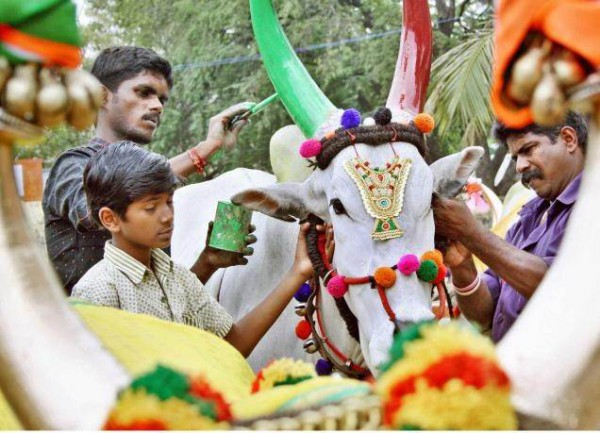
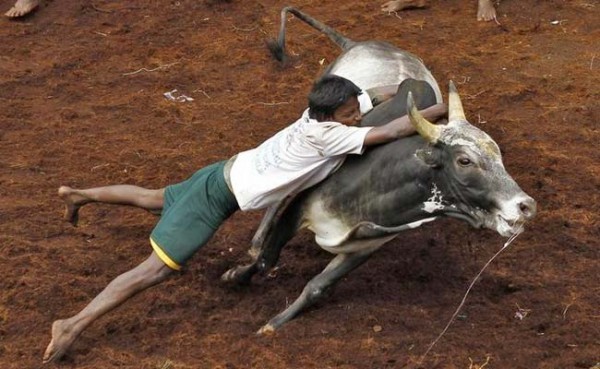
On the second day the main event ???Thai Pongal??? is celebrated as described earlier. The third day Pongal is known as ???Maattu Pongal???. The people venerate the cattle for providing dairy products, fertilizers and for ploughing and transportations. The cows are bathed, their horns coloured, foreheads smeared with sandal paste and ???kunkumum??? and multi-coloureds beads, tinkling bells and flower garlands are tied around their necks and taken around. In some villages mainly in rural areas the traditional sport ???Jallikattu??? is celebrated. It is the taming of the bull by the youths witnessed by thousands of spectators who cluster around and clamour encouraging the taming youths. In some villages bags of coins are tied to the horns. The youths vie with each other to tame the bull and grab the bag of coins. The bull seemed terrified tries to escape from the arena. This sport has been in practice for more than 2500 years. In 2014 the sport was banned by the Supreme Court following objections from animal rights activists who say it???s a cruel sport tormenting a frightened animal in an arena. But the supporters of the sport say that Jallikattu is part of Tamil Nadu???s socio-cultural heritage. A lot of controversies arose and mass scale protests against the court ruling erupted. Now Jallikattu is permitted under certain conditions.
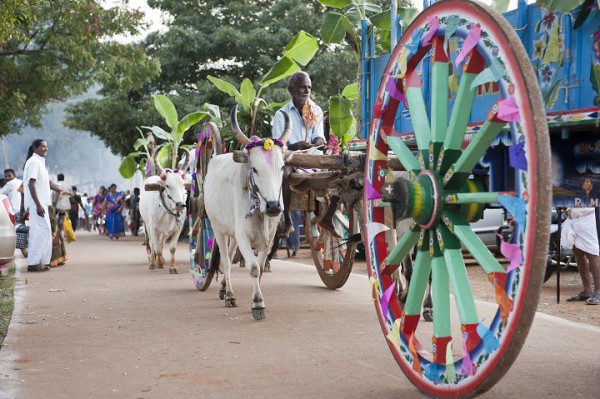
The fourth day of the Pongal is known as Kaanam Pongal literarily meaning ???sight seeing.??? People richly attired visit relatives and friends or go on tour in bullock carts, tractors, cars and buses around the city. In the evening there will be a sea of heads at sea beaches and in parks. It???s a day of festivity to spend time and be part of the entertainments outside the home.
When Thamilar Thirunaal dawns people become active and enthusiastic hoping for a bright opening in accordance to the adage, ???Thai Piranthal Vazhi Pirakkum??? (The dawn of Thai paves the way for a bright future). Tamils spread all over the world are hoping that the dawn of the Thamilar Thirunaal this year will usher happiness and prosperity and pave the way for them to live in peace honour and dignity wherever they are.
